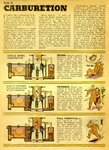Navigation
Install the app
How to install the app on iOS
Follow along with the video below to see how to install our site as a web app on your home screen.
Note: This feature may not be available in some browsers.
More options
You are using an out of date browser. It may not display this or other websites correctly.
You should upgrade or use an alternative browser.
You should upgrade or use an alternative browser.
Nice Little Explanation of Carburetors
- Thread starter MIflyer
- Start date
Ad: This forum contains affiliate links to products on Amazon and eBay. More information in Terms and rules
More options
Who Replied?- Thread starter
- #3
MIflyer
1st Lieutenant
I recall reading that the Germans used fuel injection in the DB engines, which prevented the Lean Cut/Rich Cut problems with a Merlin when the nose was shoved over. But the mechanical fuel injection systems used by the Germans required a great many more precision parts than did a carb.
In addition, the fuel injection approach did not cool the charge as the carb approach did, which added significant power.
The British adopted a standpipe in the Merlin carbs to feed fuel during negative G maneuvers and prevent the Lean cut and an orifice in the fuel supply line to prevent so much fuel entering the carb so to cause the Rich cut.
Eventually the British adopted the Bendix pressure injection carb, as the US did even before the war.
In addition, the fuel injection approach did not cool the charge as the carb approach did, which added significant power.
The British adopted a standpipe in the Merlin carbs to feed fuel during negative G maneuvers and prevent the Lean cut and an orifice in the fuel supply line to prevent so much fuel entering the carb so to cause the Rich cut.
Eventually the British adopted the Bendix pressure injection carb, as the US did even before the war.
......In addition, the fuel injection approach did not cool the charge as the carb approach did, which added significant power.....
I remember reading about this in the RR book ''The Merlin In Perspective.'' It mentioned RR had looked at fuel injection but felt they could make better power using a carburettor.
IIRC, they eventually settled on the pressure carb, or as described above, the injection carb. It had the float carb's advantage of mixture cooling because it atomized fuel into the throat of the venturi, and fuel injection's immunity to Gs. It did, however, share two drawbacks of all carburetors: carb ice, and potentially uneven mixture distribution among the cylinders if intake manifold design was not optimum. A nice happy medium.It mentioned RR had looked at fuel injection but felt they could make better power using a carburettor.
Cheers,
Wes
Last edited:
Users who are viewing this thread
Total: 1 (members: 0, guests: 1)
Similar threads
- Replies
- 0
- Views
- 487
- Replies
- 15
- Views
- 2K

